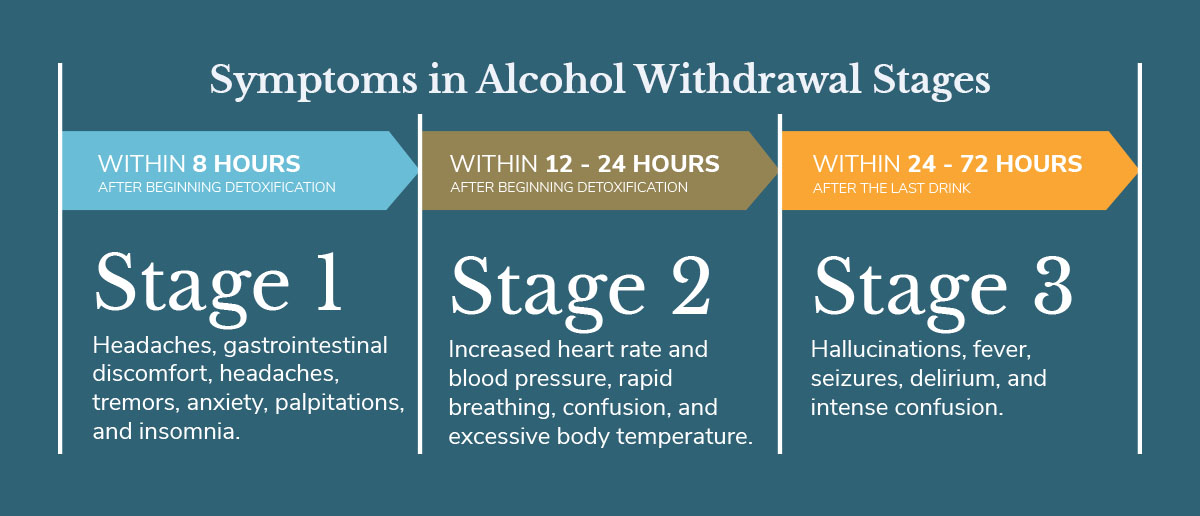Understanding the stages of alcohol detox can help you or a loved one know what to expect during rehabilitation and recovery. Seeking safe, supportive treatment is the most effective way to minimize detoxification symptoms and remain sober during and after rehabilitation because it addresses your physical, mental, and emotional needs. With the right support, you can improve your health, regain mental clarity, nourish your body, and rebuild your life.
When to Detox From Alcohol
Abstaining from alcohol is always a healthy choice, but pursuing sobriety is especially important when alcohol use disorder (AUD) develops. You or a loved one may need detox treatment if you notice the following signs of AUD:
- Inability to control alcohol consumption
- Intense alcohol cravings
- Loss of interest in previously enjoyed activities
- Spending a significant amount of time on alcohol consumption
- Increased tolerance and the need to drink more to feel the same effects
- Experience alcohol withdrawal symptoms after alcohol wears off
- Inability to address work, school, or family responsibilities due to alcohol use
- Using alcohol to handle mental health challenges and stress
- Continuing to use alcohol despite any physical, mental, and social complications it causes
How to Detox Your Body From Alcohol
The primary goal of the alcohol detox process is to remove alcohol and toxins from your system so you can regain your health, happiness, mental clarity, and overall well-being. Detox is the first step toward overcoming mental and physical alcohol dependence, and it involves abstaining from alcohol consumption.
You can detox from alcohol at home, with an outpatient treatment program, or in a residential treatment center. Where and how you choose to detox can affect your comfort level, health, safety, and long-term recovery, so seeking the best available support is essential.
What Does Alcohol Detox Feel Like?
Alcohol detox can feel different for each individual, and the severity and types of symptoms you experience depend on how much and how often you drink alcohol before stopping. For example, drinking several drinks a day before stopping can cause stronger withdrawal symptoms than drinking one or two drinks every other day. When you stop drinking alcohol and begin the recovery process, you may need help treating the following alcohol detox symptoms:
- Anxiety and depression
- Mood swings and irritability
- Fatigue
- Nightmares
- Unclear thinking
- Shakiness or jumpiness
- Sweating and clammy skin
- Rapid breathing
- Nausea, vomiting, and appetite loss
- Headache
- Alcohol cravings
- Tremors in the hands or other areas of the body
- Dilated pupils
- Rapid heart rate and increased blood pressure
- Pale skin
- Difficulty sleeping
- Excessive body temperature (hyperthermia)
In cases of ongoing heavy alcohol consumption, individuals can develop a condition known as delirium tremens after stopping. Delirium tremens can cause the following additional symptoms:
- Irritability and agitation
- Delirium or intense confusion
- Seizures
- Hallucinations
- Fever
Seeking support and medical care during the detox process can help you or a loved one cope with and reduce alcohol withdrawal symptoms. Providers can monitor your health and administer intravenous (IV) fluids and medications to keep you hydrated, safe, and as comfortable as possible.
How Long Does Alcohol Detox Take?
The duration of alcohol detoxification can vary based on a person’s preceding alcohol consumption and overall health, but people usually stop experiencing symptoms within four to five days of stopping alcohol use. It’s possible for symptoms to last a few weeks in cases of heavy alcohol consumption before detoxification, but symptoms typically occur in the following alcohol withdrawal stages:

Stage One
The first stage of the alcohol withdrawal process involves milder symptoms and typically begins within eight hours after starting alcohol detox steps. However, some people start to experience symptoms within a few days following their last drink. You or a loved one may experience symptoms such as headaches, gastrointestinal discomfort, headaches, tremors, anxiety, palpitations, and insomnia during the first alcohol detox stage.
Stage Two
Mild symptoms continue and typically peak during the second stage of detox from alcohol, but additional symptoms may also arise. These usually begin within 12 to 24 hours after beginning detoxification from alcohol, but the timeline can vary. Increased heart rate and blood pressure, rapid breathing, confusion, and excessive body temperature are more common during this stage.
Stage Three
Some individuals notice their symptoms begin to subside during stage three, which usually occurs between 24 and 72 hours after the last drink. However, delirium tremens can develop during this stage if a person detoxes from heavy alcohol consumption. This is when symptoms such as hallucinations, fever, seizures, delirium, and intense confusion are possible.
What to Do When Detoxing From Alcohol
While abstaining from alcohol use is the most important part of detoxification, you can reduce symptoms and improve your health during the process with the following tips:
Seek Professional Support and Medical Care
Professional support is incredibly helpful during the alcohol detoxification process. Medical professionals can monitor your vitals and overall condition to ensure you remain safe, and they can administer IV fluids and medications to help ease symptoms. Medical support is essential if you experience heavy and regular alcohol consumption before starting the detoxification process.
Take Care of Your Health
Caring for your health is important whether you detox at home or in a professional detox setting. Staying hydrated and eating healthy can help you reduce symptoms of alcohol withdrawal and feel rejuvenated faster.
Reach Out to Family and Friends for Additional Support
Having a strong support system in place is also essential. Let your loved ones know what you’re going through, and surround yourself with compassionate people as you work toward recovery.
Keep a Distance From Alcohol
Distancing yourself from alcohol helps reduce alcohol cravings. Remove all alcohol from your home before beginning detox, and avoid social situations involving alcohol.
What Is the Best Way to Detox Your Body From Alcohol?
Seeking medically supervised withdrawal management support is the best way to detox your body from alcohol. A holistic withdrawal management approach cares for your mental, physical, and emotional well-being to ease symptoms and increase comfort and safety during the detox treatment. Whether you need minimal or maximal medical attention, the right support system can help prevent relapse and increase your chances of long-term sobriety.
Detox Safely and Comfortably at Sana at Stowe
Detox is the courageous first step toward a healthier, happier life. Sana at Stowe offers holistic withdrawal management to help you detox from alcohol with medically supervised, individualized treatment. Our professionals use an evidence-based approach to detox, rehabilitation, and recovery to help you remain safe and increase your comfort while you pursue sobriety.
Start your recovery journey in one of the best detox centers in Vermont. A peaceful setting surrounded by Vermont’s beautiful landscape is the perfect place to heal. Sana at Stowe is a private luxury rehabilitation center offering individual and group therapy, gourmet meals, medical care, wellness activities and services, integrative learning experiences, and comfortable rooms to support your recovery.
If you or a loved one is experiencing alcohol use disorder, change is possible. With the right setting and support, you can detox from alcohol safely and pursue a sober, fulfilling life. Contact Sana to learn more about our rehabilitation approach and how we can help you begin your recovery journey.
Sana is Here to Help
Sana is here for you and your loved ones. Sana at Stowe provides high-quality treatment for those struggling with substance abuse, alcohol addiction, trauma, and PTSD. Our compassionate and professional staff is dedicated to giving our patients the recovery experience they deserve in a safe and healing environment. To learn more or to get started on your journey to recovery today, give us a call or visit our contact form.
Click here to call us: 866-575-9958



